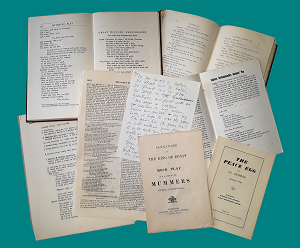|

Samples of original folk play scripts
Click on the image for more information.This is a searchable database of about 220 English language folk plays, mainly from Great Britain and Ireland, plus a few related plays from North America and the Caribbean. The geographical coverage aims to be evenly distributed among the counties that had plays. Most scripts are full texts, but some text fragments have been included where appropriate.
The database is restricted to older primary sources, collected from or
published by the original traditional performers. Accordingly, modern compositions
and scripts adapted by Folk Revival groups have not been included.
These are worthy of collection and study in their own right, but they do not usually assist research
into the original nature or history of the plays.
Available Lists and Indexes
Scripts can be located and explored using the following lists and indexes:
County List of Plays - Find texts in the database by location within country and county/state.
Interactive Map - Play locations, colour coded by type, with markers linked to the texts.
Lines Explorer - Find variations of lines by keyword, and plot maps of where the plays occur.
Character Name Index - Find plays featuring particular characters in the cast.
Compare Texts - See what lines two texts share and view them side by side.
Plays by Type - Texts sorted according to a hierarchical classification, described in: Definitions.
Definitions - Explanation of the hierarchy of play types.
Layout of Texts
All the texts in the database use a standard layout, look and feel. with the following sections:
- Context
- Location - Place, County/State, Country, and coordinates (Grid Ref. or Lat. & Lng).
- Year - The earlier of date performed, collected, cited, published or indexed.
- Time of Occurrence - e.g. Christmas, Easter, etc.
- Collective Name used for the actors - e.g. Mummers, Tipteerers, Rhymers, etc.
- Source - Bibliographic reference for the text's source publication or manuscript.
- Cast - List of the characters in the play, in order of appearance, including alternative names. All names are linked to the relevant entry in the Character Name Index, which lets you quickly see which other plays have a given character.
- Text - The play script. This usually excludes any long introductory or descriptive passages. Lines are linked the Lines Explorer, which lets you quickly see what variants of the line in other plays.
- Notes - Any footnotes from the source, plus any long introductory or descriptive passages, and notes from the indexer and/or other folk play scholars.
- Extras - Additional research data for the text, where available.
- Dramaturgical Chart - A chart visualising which lines each character speaks.
- TEI-encoded File - XML file of the script using the Text Encoding Initiative schema.
- Other Information - Any related specific information relevant to the text.
Development of the Collection
The core of the database - about 180 items - was originally assembled for the purposes of textual analysis during my PhD research on the The Origins and Development of English Folk Plays (P.Millington, 2002, summarised in P.Millington, 2003). My basic aim was to have as many different texts as possible, spread evenly across the whole of the British Isles, but focussing on the oldest available texts. Because my research interest was historical, I concentrated on the oldest available texts, as well as their related literary and ballad sources. I started with J.White's Alexander and the King of Egypt chapbook - the oldest known full text - and added further texts in approximately chronological order. A special point was made of adding the earliest editions of all the known chapbook versions. Whenever literary or ballad parallels were encountered, the originals were added too, if necessary as extracts. Further texts were added to the database after I completed my PhD, and the collection will continue to grow as I encode more texts.
This database was first made available online on a personal website, which was later transferred to the website of the Traditional Drama Research Group (TDRG) - https://folkplay.info/. The TDRG version ceased to be updatable about 2007, but was revived in a cut-down format with a different focus following redevelopment of that website in 2018. Conversely, this Master Mummers version retains all the original features and more besides. We hope to maintain the versions in parallel, but it seems inevitable that there may be some divergence in the texts they cover.
Peter Millington
References
Millington,P.T.
(2002)
The Origins and Development of English Folk Plays
Unpublished PhD Thesis, University of Sheffield, 2002
Available online at: http://etheses.whiterose.ac.uk/13/, Accessed 12th Nov.2020
Millington,P.
(2003)
Textual Analysis of English Quack Doctor Plays: Some New Discoveries
Folk Drama Studies Today: The International Traditional Drama Conference 2002,
Sheffield, Traditional Drama Research Group, 2003, ISBN 0-9508152-3-3, pp.97-132
Available online at: http://eprints.whiterose.ac.uk/937/1/Millington2002.pdf, accessed 12th Nov.2020
|